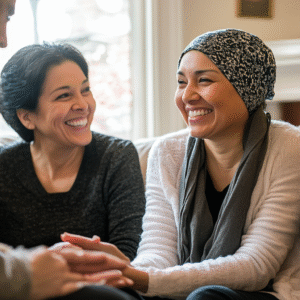Psychological Support for Cancer Patients
Cancer can affect every aspect of a person’s life, making psychological support for cancer patients an essential element of treatment and recovery. During treatment, cancer patient mental health often becomes a priority for caregivers and loved ones who want to offer the best assistance possible. Many people find that coping with cancer diagnosis demands practical tools and emotional understanding from healthcare teams and family alike. In this guide, we will explore how emotional support for cancer patients and mental health support for cancer patients can foster resilience, acceptance, and well-being.
Table of Contents
- Initial Emotional Reactions to a Cancer Diagnosis
- Understanding Cancer Patient Mental Health
- Coping with Cancer Diagnosis: Key Strategies
- Emotional Support for Cancer Patients: Role of Family and Friends
- Mental Health Support for Cancer Patients: Professional Guidance
- Open Communication with Terminal Patients
- Support for Caregivers: Balancing Empathy and Self-Care
- Conclusion
1. Initial Emotional Reactions to a Cancer Diagnosis
A cancer diagnosis often arrives like a sudden storm, shaking the foundation of one’s world. Many individuals experience denial, shock, or anger, wondering how or why this happened to them. Feeling a sense of injustice is common; questions like “Why me?” or “Are the lab results correct?” may circle through a patient’s mind. Despite these reactions being natural, psychological support for cancer patients becomes crucial at this stage, offering a guiding light in the midst of fear and uncertainty.
When the diagnosis is confirmed, a flood of emotions typically follows. For some, anger shifts toward loved ones or even medical professionals, especially if they feel their condition was not identified soon enough. Although these responses can be overwhelming, it is important to recognize that they are part of the healing journey. By acknowledging these emotions, patients can begin to move forward and actively pursue cancer patient mental health strategies that nurture well-being.
2. Understanding Cancer Patient Mental Health

A person’s mental and emotional well-being plays a significant role in their overall health. Cancer patient mental health is not only about avoiding depression or anxiety but also about fostering resilience, hope, and self-esteem throughout treatment. Patients who receive emotional support for cancer patients from healthcare teams, psychologists, or loved ones often cope better with side effects and can actively participate in treatment decisions.
Research has demonstrated that patients dealing with cancer face unique psychological challenges, including fear of mortality, concerns about family, and potential lifestyle changes. Addressing these worries with psychological support for cancer patients can ease distress, lower stress hormones, and foster a more positive outlook. Supportive resources might include counseling, group therapy, or even online forums where individuals share experiences, helping each other develop healthier perspectives on life after diagnosis.
The Importance of Early Intervention
The earlier patients begin seeking mental health support for cancer patients, the more effectively they can tackle challenges that might arise. Prompt interventions—such as psycho-oncology services, mindfulness training, or family counseling—can create a safe space for patients to speak openly about their anxieties. This proactive approach to cancer patient mental health helps establish coping strategies before the physical and emotional strains of cancer treatment intensify.
3. Coping with Cancer Diagnosis: Key Strategies

Coping with cancer diagnosis can be an overwhelming process, but numerous strategies exist to ease the burden. Many hospitals and clinics offer structured psychological programs designed specifically to provide psychological support for cancer patients and help individuals navigate emotional turbulence.
Seeking Professional Help
Psychotherapists, oncopsychologists, and counselors specialized in oncology understand the unique struggles cancer patients face. By offering mental health support for cancer patients, professionals guide them in processing fear, sadness, and uncertainty, ensuring they feel heard and understood. These experts may use a range of techniques, including cognitive-behavioral therapy, relaxation exercises, or psychosomatic interventions, to bolster emotional resilience.
Acceptance of the Diagnosis
Accepting the reality of a cancer diagnosis does not mean giving up. Rather, it involves recognizing the challenge at hand and deciding to move forward with hope and determination. True acceptance can empower patients to become active participants in their own care. Many individuals find that coping with cancer diagnosis feels less daunting once they have processed the initial shock and recognized that treatment, lifestyle adjustments, and emotional support can produce meaningful results.
Creating a Support Network
Having people to lean on can be a lifeline. Whether it is family, friends, or fellow patients, establishing a dependable circle of support is crucial for cancer patient mental health. Group therapy sessions, local or online support groups, and faith-based communities can all serve as pillars of strength. By sharing worries and exchanging coping tips, patients realize they are not alone and can develop new strategies to manage stress, pain, and the demands of treatment.
4. Emotional Support for Cancer Patients: Role of Family and Friends
Emotional support for cancer patients involves compassionate understanding from those closest to them. Family members and friends often become informal caregivers, lending both emotional and practical help. Striking a balance, however, is essential: overly cheerful attitudes or intrusive caregiving can sometimes make a patient feel smothered or misunderstood.
Encouraging, Not Overpowering
Loved ones should reassure patients that they are valued and their feelings are acknowledged. Rather than denying the gravity of the situation with constant positivity, family members can sit quietly with the patient, allowing space for honest conversation. Respectful listening validates the patient’s emotions and fosters a deeper connection. This type of emotional support for cancer patients helps maintain dignity and reminds them they are more than their diagnosis.
The Fine Line Between Helping and Overdoing
Patients often need assistance with daily activities or simply want company during medical appointments. However, it is important for caregivers not to rob patients of their independence. Offering help when needed but encouraging self-reliance where possible maintains the patient’s sense of autonomy. This approach, rooted in psychological support for cancer patients, can preserve self-esteem and promote a stronger mental outlook.
A Note on Research Findings
Researchers from various medical institutions have noted that strong social support can improve survival rates. Studies show that patients who receive robust mental health support for cancer patients from family often report higher levels of satisfaction with treatment, fewer symptoms of depression, and an overall better quality of life.
5. Mental Health Support for Cancer Patients: Professional Guidance
Professional interventions can make a substantial difference in cancer patient mental health. The psychosomatic correction methods used today are numerous and varied, from expressive arts therapy to structured oncopsychological programs.
Oncopsychological Programs
Among the well-known programs is the Simonton method, originally developed to harness a patient’s self-healing capabilities by leveraging relaxation, visualization, and self-belief. This structured therapy integrates psychological support for cancer patients and addresses the emotional hurdles that often arise during cancer treatment. Patients learn to concentrate on hope and manage stress, which can be crucial for sustaining physical energy and motivation to fight the disease.
Embracing Therapy as a Lifeline
It is vital that any form of mental health support for cancer patients is ongoing, adapting to the patient’s needs at each treatment stage. For instance, chemotherapy or surgery can be physically draining, and patients may feel disheartened. Regular sessions with a psychologist or mental health counselor ensure they have a safe space to vent frustrations, grieve changes, and reclaim hope.
6. Open Communication with Terminal Patients
Some patients confront terminal stages of cancer, where treatment shifts from cure-focused to comfort-focused. In these cases, psychological support for cancer patients centers on honesty, empathy, and companionship.
Addressing Fears and Uncertainties
Patients often fear the unknown and worry about how their final days will unfold. Providing emotional support for cancer patients at this stage means inviting open conversations about their wishes, thoughts, and regrets. Sometimes, they simply need someone to listen. Sharing concerns about pain management, unresolved conflicts, or practical matters like legal documents can relieve a tremendous burden.
Acknowledging the Spiritual or Existential Aspect
Terminal patients may also require spiritual or existential guidance, whether through faith-based counseling or philosophical discussion. The goal is not to push any agenda but to respect and honor the patient’s beliefs, helping them find solace. The presence of family and friends, coupled with professional mental health support for cancer patients, offers assurance that they will not face the end alone.
7. Support for Caregivers: Balancing Empathy and Self-Care
Caregivers carry significant emotional weight while tending to the needs of their loved ones. Whether it is driving them to appointments, managing medication schedules, or providing constant reassurance, the pressure can be immense.
Recognizing Caregiver Stress
Caregivers themselves need psychological support for cancer patients methodologies—applied to their own well-being. Grief, anxiety, and fatigue can overwhelm even the most devoted caregiver. Family members and friends should be encouraged to seek counseling, join support groups, or take regular breaks to replenish their emotional reserves. By doing so, they remain more capable of delivering meaningful emotional support for cancer patients and maintain their own health.
Finding Healthy Coping Strategies
Journaling, mindfulness exercises, and self-care routines (such as walking, hobbies, or meditation) can sustain a caregiver’s mental health. Openly sharing fears and frustrations within a supportive environment can prevent burnout. Many cancer care centers extend mental health support for cancer patients to include caregivers, ensuring that the entire support network functions effectively.
Integrating the Paraphrased Recommendations on Psychological Care
In many scenarios, when patients first hear “suspicion of cancer,” they experience an internal shock—like lightning striking out of the blue. Often, they hope laboratory results were mixed up or that there has been some error. When denial fades and the diagnosis is confirmed, waves of anger or frustration can arise, sometimes directed at family members for “not noticing sooner” or even at medical teams who may have missed early symptoms.
No matter the emotional rollercoaster, having psychological support for cancer patients at every stage of treatment is essential. Modern psychosomatic correction methods, including well-known oncopsychotherapeutic programs, guide individuals in awakening their own self-healing potential. While acknowledging the reality of the illness is important, genuine acceptance takes the process a step further by helping individuals find strength to keep fighting.
Family members can provide invaluable assistance by encouraging the patient to hold onto a sense of purpose. Simple acts—like spending quality time, offering a listening ear, or engaging in creative pursuits—improve quality of life and even have the potential to prolong it. Research from several universities indicates that patients with supportive social environments often show higher survival rates post-treatment. Loved ones must remember that showing respect and empathy is more beneficial than excessive cheerfulness or overbearing care.
For terminal patients, emotional support for cancer patients involves acknowledging fears about physical decline, including loss of bladder or bowel control, and worries of abandonment. Compassionate conversation—listening attentively to their experiences and helping resolve lingering conflicts—can bring immense relief. Meanwhile, family members grappling with the reality of impending loss also require psychological assistance, ensuring they can process grief in a healthy way.
8. Conclusion
Psychological support for cancer patients remains a cornerstone of holistic care. It weaves together compassion, open communication, and specialized interventions to address the entire spectrum of emotional and mental challenges. By promoting cancer patient mental health early in the journey and providing structured avenues for coping with cancer diagnosis, patients are more likely to feel confident, hopeful, and determined.
When families and friends offer balanced assistance—mindful of autonomy and attentive to genuine feelings—emotional support for cancer patients becomes an empowering force. Likewise, professionals trained in mental health support for cancer patients are integral to guiding individuals through the complexities of treatment and survivorship. From helping terminal patients find peace to ensuring caregivers receive adequate resources, this comprehensive approach enriches lives at every step.
Wherever a patient may be on the path—from the first hint of diagnosis to palliative care—they should never have to face it alone. Psychological support for cancer patients creates a vital network of hope, empathy, and resilience that uplifts not only those with cancer, but also the people who stand beside them.


